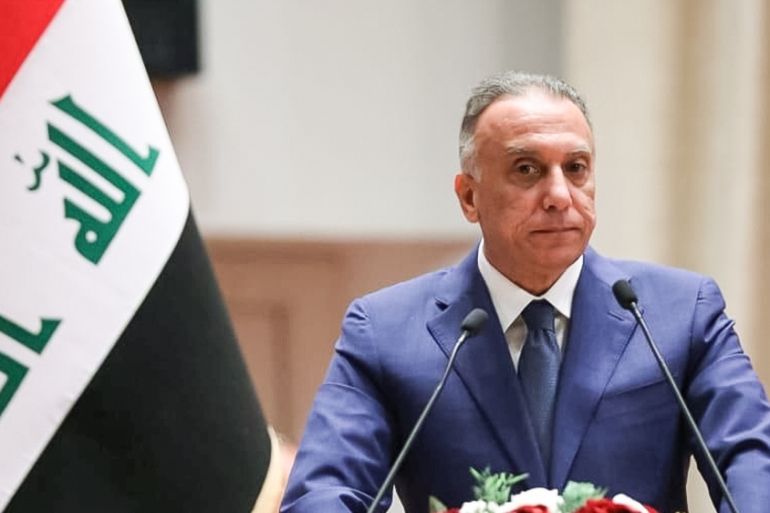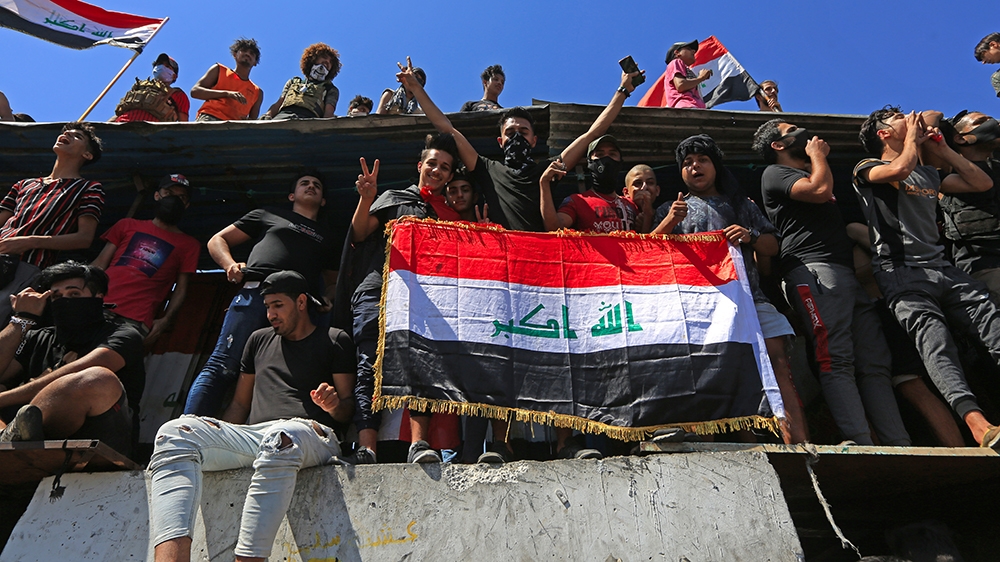Mustafa al-Kadhimi ends Iraq deadlock but new PM faces hurdles
Former intelligence chief’s appointment comes amid major crises: mass protests, coronavirus and plunging oil prices.

As the Iraqi parliament approved the majority of former intelligence chief Mustafa al-Kadhimi’s ministerial picks on Thursday, it effectively paved the way for a new phase in Iraqi politics with him as prime minister.
The appointment of al-Kadhimi ended a political deadlock that left the country without a fully functioning government for more than five months. Two previous leaders had failed to form a new cabinet because of rival wrangling after Adel Abdul Mahdi stepped down in November amid mass anti-government protests.
But al-Kadhimi’s ascent to the premiership has not been a smooth ride. By the time he finally addressed parliament on Thursday, it was only after a long and complicated process of backdoor negotiations with Iraq’s various political blocs and party leaders.
The rival factions had refused to agree on al-Kadhimi’s proposed names, forcing him to change his candidate lists at least three times ahead of the vote. Still, some blocs boycotted the May 7 session that ran more than three hours behind schedule because of last-minute consultations in parliament’s cafeteria.
But al-Kadhimi, 53, began his term, albeit without a full government. Five of his 20 candidates were rejected and two key posts – ministers of oil and foreign relations – remained empty.
Filling these ministerial posts, however, is far from al-Kadhimi’s only challenge. The former journalist came to power amid three major crises: plunging oil prices that have caused a steep budget deficit and potential economic catastrophe; the coronavirus pandemic that Iraq’s fragile healthcare system has struggled to cope with; and strong popular protests that returned to the streets after a short lull because of COVID-19-related curfews.
Mass protests
The most immediate challenge facing al-Kadhimi appears to be the resumption of mass anti-government demonstrations in the capital, Baghdad, and several other cities especially in Iraq’s south, including Nasiriya, Basra, Al-Kut and Diwaniya.
Since Saturday, hundreds of demonstrators marched back to the streets and tried to occupy bridges and public squares as they called for better living conditions and a complete overhaul of the political system. In Basra, protesters went further, demanding the removal of the oil-rich province’s governor, Assad al-Eidani.
“Kadhimi represents the system we want gone. We demand a complete overhaul of the political system and an end to the corrupt political elite who put him in power,” said Ali Hussein, a 22-year-old student who joined the protests in Baghdad’s Tahrir Square.
The developments came as al-Kadhimi attempted great strides to appease the protesters. He ordered the release of detained anti-government demonstrators and compensation for the families of hundreds of victims who died since protests began in October last year.
He also reinstated Lieutenant-General Abdul Wahab al-Saadi, a well-respected military figure in the fight against the armed group ISIL (ISIS), as head of the counter-terrorism service. The removal of al-Saadi by former Prime Minister Abdul Mahdi had angered many Iraqis and sparked the popular protests.
Al-Kadhimi further promised to dispense pensions, overturning a decision by the previous administration to freeze state spending, including civil servants’ salaries and pensions – income that one-fifth of Iraqis heavily rely on.
But observers said these moves were unlikely to calm down the demonstrations.
“The protesters are not fooled by Kadhimi’s cosmetic gestures. They know all the tricks of this political regime and Kadhimi is just the most ‘updated version’,” Iraqi novelist Sinan Antoon told Al Jazeera.
“The protesters want genuine change.”

Economic collapse?
All three crises facing Iraq are tightly intertwined. As Iraq’s crude-oil-dependent economy struggles to cope with the aftermath of the coronavirus pandemic and large budget deficits, protesters’ grievances are likely to increase.
|
|
A historic crash in oil prices last month saw Baghdad earn only about one-sixth of its average oil revenues in April, according to official figures.
This forced the government to consider cost-saving methods including austerity measures and cuts to social benefits to civil servants.
The deterioration of living conditions, a lack of basic services, and high levels of unemployment have been key issues driving Iraq’s protests.
With budget cuts putting a deep dent on many household incomes, and thousands of people unable to work amid coronavirus-related restrictions, more Iraqis will likely join the anti-government demonstrations.
“The plunging oil prices and its drastic effect on the loss of many jobs in Iraq will encourage a lot of the employees who’d [previously] feared losing jobs to join the protests now,” said independent Iraq analyst Zeidon Alkinani. “This could gradually eliminate the ‘business as usual’ factor that had negatively affected the protest movement.”
According to World Bank estimates, Iraq’s economy is expected to contract 9.7 percent this year – the lowest dip since the US-led invasion in 2003.
The muhasasa
Along with the approval of a new cabinet, Iraq’s parliament also accepted al-Kadhimi’s programme. From holding early elections after finalising the new electoral law, to addressing other key protester demands – ending corruption, starting a national dialogue, and bringing perpetrators to justice – and protecting Iraq’s sovereignty, the comprehensive agenda left no stone unturned.
But according to Iraq expert Toby Dodge, al-Kadhimi’s objectives are overly ambitious and resemble those of previous prime ministers, whose plans were unachievable because of the country’s deeply entrenched quota-based political system, the muhasasa.
“The barriers stacked against Kadhimi are huge. They start and finish with the muhasasa,” said Dodge, a professor at the London School of Economic’s Middle East Centre. “Ending it would require removing the dominance and corruption of the big party blocs. There no chance of that.”
The system – which was introduced after the 2003 United States-led invasion of Iraq to provide proportional representation among the country’s ethnic and sectarian groups – created an impasse that has allowed corruption to flourish and patronage networks among political factions to maintain control over business and politics.
The complicated process of replacing Abdul Mahdi since November underscores profound divisions within Iraq’s political groups, and has been indicative of their deeply rooted and vested interests in the face of crucial reforms.
“The blocs ensured since Kadhimi’s designation … that he knew that they have the power and he didn’t,” said Dodge. “He went in with high ideals for an independent cabinet, but ended up with another muhasasa government.
“How then is he going to get the power to get through his programme?” Dodge asked.
According to Dodge, Kadhimi can try to circumvent these groups through only two ways, both of which are “dangerous”.
“Kadhimi can either mobilise the people behind him … or build up power in his office and in a parallel power structure to the state institution, like [former leader] Maliki did. That would give Kadhimi short-term power but on the long term, it would weaken the state,” Dodge told Al Jazeera.
Accused of running a parallel government during his time in office, former Prime Minister Nouri al-Maliki built a structure of loyal civil servants underneath the cabinet to achieve his goals. He was blamed for sectarian, corrupt, and divisive policies that led to widespread Sunni-Shia killings and the collapse of the Iraqi army.
But according to independent Iraq analyst Sajad Jiyad, while the nomination of Kadhimi showed that the muhasasa was still the way Iraqi politics worked, the new premier will be able to make important reforms.
“Kadhimi is pragmatic. On some issues, he will have to deal with muhasasa by engaging the political blocs. On others, he will put his foot down, especially on key matters around security and foreign relations,” he told Al Jazeera.
Still, Jiyad said he believes that given al-Kadhimi’s promise to hold early elections within 12 to 18 months, the temporary nature of his government can only allow for little of his programme to be executed.
“Not much can be achieved during that time beyond achieving stability,” said Jiyad.
Despite the limited time, Iraqi political analyst Hisham al-Hashimi, said Kadhimi will strive to fulfill as many of the Iraqi people’s aspirations as he prepares for free and fair elections, a new electoral law and an independent electoral commission – three key protester demands.

US-Iran tensions
Al-Kadhimi will also have to balance competing interests and demands from Iraq’s two main allies, the US and Iran, while maintaining Iraq’s sovereignty and security as well.
Tensions between the two foes Washington and Tehran continued to spill over into Iraq in recent months.
As Iran-backed armed groups targeted US bases and members staged violent anti-American protests at the US embassy in Baghdad since last year, Washington assassinated Iranian General Qassem Soleimani of the elite Quds Force in an air strike near Baghdad’s airport on January 3.
|
|
Although al-Kadhimi’s approval reflected a level of consensus among political blocs, he continues to face opposition from the Iran-backed Kataib Hezbollah, a powerful armed group that the US has blamed for several attacks on US forces.
The group, which sees al-Kadhimi as a US ally, accuses him of complicity in the killing of Soleimani and former deputy leader of the Popular Mobilisation Forces (PMF) Abu Mahdi al-Muhandis.
Kataib Hezbollah is also one of the main voices calling for the expulsion of US forces in Iraq as part of a parliamentary demand since January 5 for all foreign troops to withdraw.
Most non-US forces have since left Iraq, and the US has restructured its presence, withdrawing its troops from five bases while consolidating them into fewer larger hubs.
But after ISIL launched a deadly attack that killed several PMF members in Salahuddin province last week, Baghdad and Washington are both worried about the resurgence of the armed group.
Their shared concern may see a continued presence for the US-led coalition, which has been present in Iraq since 2014 to help the country fight the armed group.
“The US may offer continued training and support for the Iraqi army,” said Dodge about strategic US-Iraq talks scheduled for next month. “The Iraqis need it, but that runs up against the issue from more rejectionist forces in Iraq who want all Americans gone. There is a contradiction.”
Balancing foreign relations
Still, analysts were more positive about al-Kadhimi’s ability to balance relations between Iran and the US, saying as a former intelligence chief he has good relations with both powers.
US Secretary of State Mike Pompeo congratulated al-Kadhimi shortly after his appointment and announced a four-month electricity waiver for Iraq, allowing Baghdad to import energy from Tehran despite US sanctions. The gesture appeared to be a show of support for the new government.
Likewise, Iran’s Foreign Minister Mohammad Javad Zarif congratulated the new premier in a post on Twitter, saying Tehran stands with the Iraqi people and their choice.
“Kadhimi has good relations with the US. But he would not have become prime minister if the Iranians didn’t want him, too,” said Dodge. “They’ll be happy if he can balance relations with Washington and Tehran equally, if not more strongly.”
According to Jiyad, al-Kadhimi might even manage to relieve some of the tensions between Iran and the US.
“There is potential for Kadhimi to diffuse the situation between the two countries on Iraqi soil … at least for a few months,” he said. “They [US and Iran] realise that a period of stability in Iraq is necessary.”
|
|